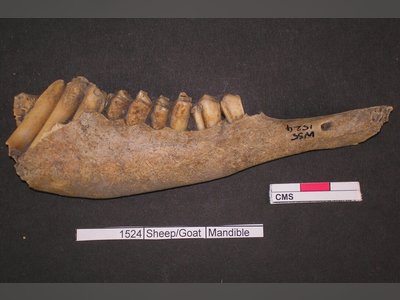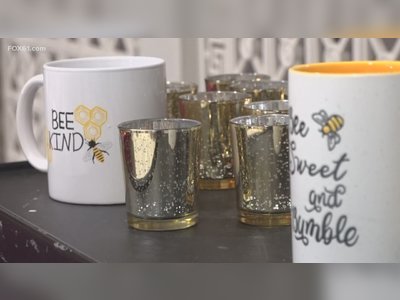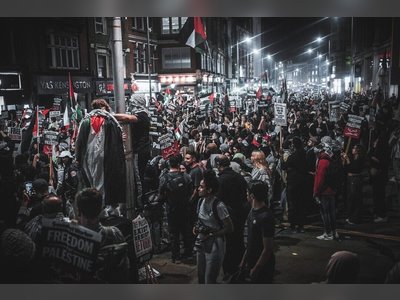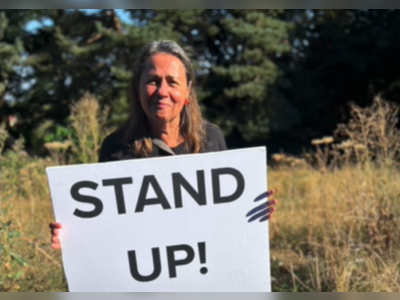
COVID-19 Bereaved Families Share Heartbreaking Stories of Loss, Abuse, and Need for Better End-of-Life Care
The UK's Covid-19 Inquiry has heard from several bereaved families who have experienced abuse and targeted online attacks.
One of the witnesses, Matt Fowler, co-founder of Covid-19 Bereaved Families for Justice, shared that he and others in the organization have been stalked and threatened via social media.
Fowler's father, Ian, died in April 2020 after being infected with the virus.
Fowler also spoke of the lack of compassion and understanding shown by some people towards those who have lost loved ones to Covid-19.
He stressed that such abuse is unique to their loss and that no one would question the death of a loved one from another cause in the same way.
The inquiry, which is focused on resilience and preparedness, heard from several groups representing bereaved families across the UK.
It is expected to hold public hearings until 2026 and is aimed at learning lessons from the pandemic.
During the inquiry on Tuesday, Jane Morrison, who represents Scottish Covid Bereaved, shared her experience of losing her wife Jacky in 2020, five days after she caught Covid in hospital.
She thanked key workers for their compassion and emphasized the importance of infection control in hospitals, which she described as "close to my heart." Anna-Louise Marsh-Rees, leader of Covid-19 Bereaved Families for Justice Cymru, also gave evidence, sharing her father Ian's story.
He died at the age of 85 after catching the virus in hospital, where he had been admitted for gallbladder problems.
The inquiry chairwoman, Baroness Heather Hallett, responded to Fowler's testimony by acknowledging the abuse as "plain cruel." She promised to learn any lessons that could be gleaned from the testimony and to answer any questions that arose during the inquiry.
The Covid-19 Inquiry is separate from the Scottish Covid-19 Inquiry, which is also ongoing.
While the UK inquiry does not have a formal deadline, it is expected to hold public hearings until 2026.
A heart-wrenching testimony by a daughter who watched her father die a painful death at home due to COVID-19 has brought attention to the need for better end-of-life care during the pandemic.
The daughter, Marsha Rees, described how her father had been shielding at home for months to protect himself and how it was "awful" to watch him "die gasping for breath".
She added that many members of her group are "haunted" by the idea of going to hospitals and no longer feel they are a safe place.
The issue of COVID-19 related deaths being treated as "toxic waste" has been raised by Rees, who wants to change the way deaths are handled by health boards.
She emphasized the need for families to be prepared and supported before and after the death of a loved one, including palliative care and dignity in death.
Rees said that after her father's death, he was "zipped away" and his belongings were put in a Tesco carrier bag, which she found to be "awful".
Brenda Doherty, whose mother was the first woman to die in Northern Ireland with Covid, at the age of 82, also gave evidence to the inquiry.
Doherty expressed her regret at not being able to kiss her mother one last time, or bury her in her favorite red dress.
She said that she had been very vocal about her mother's death and that she wouldn't become a statistic, but that everyone will know who she was, the life she had, and not just how she died.
The testimony of these individuals highlights the importance of proper end-of-life care during the COVID-19 pandemic.
Healthcare systems need to prepare for and support families during this difficult time, ensuring that dignity and compassion are maintained throughout the process.
Fowler's father, Ian, died in April 2020 after being infected with the virus.
Fowler also spoke of the lack of compassion and understanding shown by some people towards those who have lost loved ones to Covid-19.
He stressed that such abuse is unique to their loss and that no one would question the death of a loved one from another cause in the same way.
The inquiry, which is focused on resilience and preparedness, heard from several groups representing bereaved families across the UK.
It is expected to hold public hearings until 2026 and is aimed at learning lessons from the pandemic.
During the inquiry on Tuesday, Jane Morrison, who represents Scottish Covid Bereaved, shared her experience of losing her wife Jacky in 2020, five days after she caught Covid in hospital.
She thanked key workers for their compassion and emphasized the importance of infection control in hospitals, which she described as "close to my heart." Anna-Louise Marsh-Rees, leader of Covid-19 Bereaved Families for Justice Cymru, also gave evidence, sharing her father Ian's story.
He died at the age of 85 after catching the virus in hospital, where he had been admitted for gallbladder problems.
The inquiry chairwoman, Baroness Heather Hallett, responded to Fowler's testimony by acknowledging the abuse as "plain cruel." She promised to learn any lessons that could be gleaned from the testimony and to answer any questions that arose during the inquiry.
The Covid-19 Inquiry is separate from the Scottish Covid-19 Inquiry, which is also ongoing.
While the UK inquiry does not have a formal deadline, it is expected to hold public hearings until 2026.
A heart-wrenching testimony by a daughter who watched her father die a painful death at home due to COVID-19 has brought attention to the need for better end-of-life care during the pandemic.
The daughter, Marsha Rees, described how her father had been shielding at home for months to protect himself and how it was "awful" to watch him "die gasping for breath".
She added that many members of her group are "haunted" by the idea of going to hospitals and no longer feel they are a safe place.
The issue of COVID-19 related deaths being treated as "toxic waste" has been raised by Rees, who wants to change the way deaths are handled by health boards.
She emphasized the need for families to be prepared and supported before and after the death of a loved one, including palliative care and dignity in death.
Rees said that after her father's death, he was "zipped away" and his belongings were put in a Tesco carrier bag, which she found to be "awful".
Brenda Doherty, whose mother was the first woman to die in Northern Ireland with Covid, at the age of 82, also gave evidence to the inquiry.
Doherty expressed her regret at not being able to kiss her mother one last time, or bury her in her favorite red dress.
She said that she had been very vocal about her mother's death and that she wouldn't become a statistic, but that everyone will know who she was, the life she had, and not just how she died.
The testimony of these individuals highlights the importance of proper end-of-life care during the COVID-19 pandemic.
Healthcare systems need to prepare for and support families during this difficult time, ensuring that dignity and compassion are maintained throughout the process.










